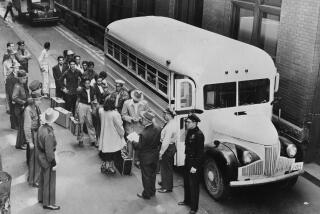Savannah Divided Over Monument
- Share via
SAVANNAH, Ga. — No one disputes that a monument to slaves is overdue in this mostly black Southern city where none of the more than 40 plaques, pillars and statues pays tribute to blacks.
But even those who welcome the proposed $350,000 granite-and-bronze African American Monument--showing a black family with broken chains at their feet--cringe at a quotation that some want inscribed at its base.
Attributed to poet Maya Angelou, it reads in part: “We lay back to belly in the holds of the slave ships in each others’ excrement and urine together, sometimes died together, and our lifeless bodies thrown overboard together.”
There is no argument about the passage’s brutal truth. But critics say it is too harsh for a monument on the promenade by the Savannah River, one of the hottest tourist spots in this city of 137,000 people, 52% of them black.
The City Council is torn.
“Maya Angelou’s description was a little far out,” said David Jones, a black city councilman. “I myself wouldn’t want to be reminded of that every time I look at it. History . . . can hurt.”
Floyd Adams, Savannah’s first black mayor, has likened the words to Georgia’s former state flag with its Confederate symbol. “I don’t want to polarize this community,” he said. “I think those words are more divisive than anything.”
But Clifton Jones Jr., another black councilman, defends the passage as an unflinching portrayal of the horrors of slavery.
“They were bound and chained in the bottom of the ships. And if they had to have a bowel movement, or whatever, they had to do it right there,” Jones said. “It may be derogatory, but it’s the truth.”
Abigail Jordan, who came up with the idea for the monument a decade ago, has fought to retain the quotation. Already, she said, she has had to do her share of “ranting and raving” to get her way on other project details.
She held her ground with city planners who suggested building the monument at a church rather than the riverfront. And she fought critics who did not want the sculpture to include chains, broken or not.
Savannah residents, Jordan said, need to recognize slavery as part of their history.
Slave labor was outlawed in Georgia when Gen. James Oglethorpe established a colony at Savannah in 1733. Oglethorpe envisioned Georgians living off their own hard work. But by 1750 slavery was legal, and Georgia’s slave population boomed from a few hundred to about 18,000 by 1775.
“That’s a facet of our history that’s been a big thing here ever since the beginning of Savannah. It’s sort of a shameful omission,” said Lisa White, head of the city’s Historic Site and Monument Commission.
The panel approved the monument, quotation and all, in 1998. The project then passed to the City Council, which voted last month to accept the sculpture but put off a decision on the inscription.
One of the problems, officials said, is that Jordan’s group cannot pinpoint the source of the Angelou quotation. Variations of it can be found on the Internet in transcripts of Angelou’s speeches. City planners wrote to her in November asking for the source of the passage and permission to use it. She has not responded.
The poet also did not respond to a call and e-mail from the Associated Press.
Jordan said she is concentrating more on raising money now. The city will contribute about $30,000 to prepare the site, and donations will have to pay for the rest.
“I’m very confident that eventually it will be done,” Adams said.
More to Read
Sign up for Essential California
The most important California stories and recommendations in your inbox every morning.
You may occasionally receive promotional content from the Los Angeles Times.













